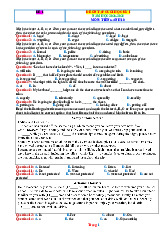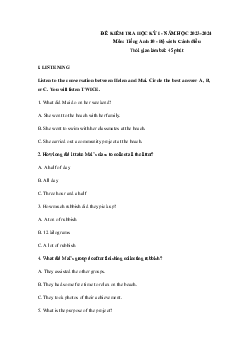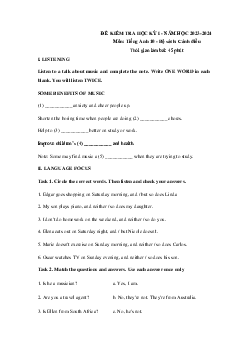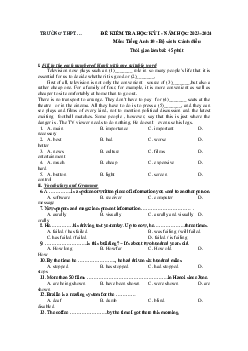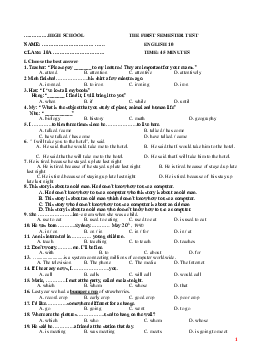



Preview text:
SỞ GIÁO DỤC VÀ ĐÀO TẠO
KIỂM TRA HỌC KỲ I NĂM HỌC 2017-2018 QUẢNG NAM
Môn: TIẾNG ANH – Lớp 10
Thời gian: 45 phút (không kể thời gian giao đề) ĐỀ CHÍNH THỨC
(Đề gồm 03 trang) MÃ ĐỀ: 502
A. MULTIPLE CHOICE: (7.5pts)
Mark the letter A, B, C, or D on your answer sheet to indicate the word whose underlined part
differs from the other three in pronunciation in each of the following questions.
Question 1: A. camcorder B. entertain C. inventor D. excursion
Question 2: A. shot B. wrong C. top D. clothes
Mark the letter A, B, C, or D on your answer sheet to indicate the word(s) CLOSEST in
meaning to the underlined word(s) in each of the following questions.
Question 3: She taught in a school for the deaf and dump.
A. people who have a bad memory
B. people who are mentally ill
C. people who are unable to hear and speak D. people who are unable to see and speak
Question 4: We read newspapers and magazines which have been produced on computers. A. manufactured B. begun C. born D. shaped
Mark the letter A, B, C, or D on your answer sheet to indicate the correct answer to each of the following questions.
Question 5: Most of the children come from large and poor families, which ________ them from having proper schooling. A. leads B. makes C. prevents D. gets
Question 6: After he had finished his homework, he _________ games. A. played B. has played C. had played D. plays
Question 7: We are in regular ________ with each other by telephones or letters. A. communication B. communicative
C. communicatively D. communicate
Question 8: Marie Curie was born in Warsaw _________November 7th, 1869. A. up B. on C. in D. out
Question 9: A film which is made by photographing a series of changing drawings is called a ________. A. comedy B. drama C. documentary D. cartoon
Question 10: Don’t forget _________ me a letter when you arrive in Hanoi! A. sending B. to sending C. to send D. send
Question 11: With a computer, you can visit many places of scenic ________ in the world. A. beautiful B. beauty C. beautify D. beautifully
Question 12: She was given an award for her services to _________. A. the disabled B. disable C. the disability D. disabled
Question 13: He did finally come with us, although it took a long time to __________ him. Page 1 A. permit B. persuade C. believe D. take
Question 14: Tom and I _________ close friends since we were at the age of six. A. was B. have been C. has been D. were
Mark the letter A, B, C or D on your answer sheet to indicate the most suitable response
to complete each of the following exchanges.
Question 15: Jane: “Well, what shall we do today? Any idea?”
Mai: - “___________________________”
A. I am not sure. It depends on the weather. B. We went to the concert.
C. Is there anything more exciting? D. That sounds great.
Question 16: Janet: “What do you think of cartoons?” An: “____________”
A. It sounds meaningless.
B. I don’t think so. It’s boring.
C. Oh, I find them interesting.
D. Don’t mention it. I think so.
Read the following passage and mark the letter A, B, C, or D on your answer sheet to indicate
the correct word that best fits each of the numbered blanks from 17 to 20.
The most famous diary in English was written by Samuel Pepys. It gives a detailed and
interesting (17)_____ of everyday life in England between 1660 and 1669. Pepys writes (18)____
important news stories of the time, like disease, an enemy navy sailing up the river Thames
(19)____ the Great Fire of London. He also writes about himself, even about his (20)______ – he
often slept during church or looking at pretty girls.
Question 17: A. descriptive B. describable C. describe D. description Question 18: A. to B. for C. about D. out Question 19: A. or B. so C. but D. and Question 20: A. dreams B. faults C. plans D. accidents
Read the following passage and mark the letter A, B, C, or D on your answer sheet to indicate
the correct answer to each of the questions from 21 to 24.
Alfred Bernhard Nobel, a Swedish inventor and philanthropist, bequeathed most of his vast
fortune in trust as a fund from which annual prizes could be awarded to individuals and
organizations that had achieved the greatest benefit to humanity in a particular year. Originally,
there were six classifications for outstanding contributions designated in Nobel’s will, including
chemistry, physics, physiology or medicine, literature and international peace.
The prizes are administered by the Nobel Foundation in Stockholm. In 1969, a prize for
economics endowed by the Central Bank of Sweden was added. Candidates for the prizes must be
nominated in writing a qualified authority in the field of competition. Recipients in physics,
chemistry, and economics are selected by the Royal Swedish Academy of Sciences; and
physiology or medicine by the Caroline Institute; in literature by the Swedish Academy; and in
peace by the Norwegian Nobel Committee appointed by Norway’s parliament. The prizes are
usually presented in Stockholm on December 10, with the King of Sweden officiating,
an appropriate tribute to Alfred Nobel on the anniversary of his death. Each one includes a gold
medal, a diploma, and a cash award of about one million dollars.
Question 21: What does this passage mainly discuss?
A. Great contributions to mankind B. The Nobel prizes Page 2
C. Alfred Bernhard Nobel
D. Swedish philanthropy
Question 22: How often are the Nobel prizes awarded? A. Five times a year
B. Once every two years C. Twice a year D. Once a year
Question 23: The word “one” in paragraph 2 refers to _____. A. candidate B. tribute C. prize D. anniversary
Question 24: Which individual or organization serves as administrator for the trust?
A. The Nobel Foundation
B. Swedish and Norwegian academies and institutes C. The King of Sweden
D. The Central Bank of Sweden B. WRITING: (2.5pts)
For the questions from 25-28, finish each of the sentences in such a way that it means the
same as the sentence printed before it. Write your answers on your answer sheet.
Question 25: His family always spent their holidays climbing in the mountains.
à His family used to ………………………………………………………….……………………
Question 26: They have told him to report for duty at six.
à He……………… ... …………………………………………………………………………...
Question 27: Although Tom was poor, he studied very well.
à Despite…………………………..………………………………………..……………………...
Question 28: Just as he put the phone down, it rang again.
à No sooner………………………………………………………………………………………
For questions from 29-32, rewrite each of the sentences as directed. Write your answers on
your answer sheet.
Question 29: Daisy goes to work by bus because she lives far from her company. (Make question
for the underlined words)
à ………………………………..…………………………………………………………………
Question 30: He tries to learn English well so that he can get a good job. (Use Phrase of Purpose)
à ………………………………..…………………………………………………………………
Question 31: The street I live in is very noisy at night. This makes it difficult to sleep. (Use Which as a connector)
à ………………………………..…………………………………………………………………
Question 32: Michael often comes to play with me. His sister is a famous singer. (Use relative clause)
à ………………………………..………………………………………………………………… Page 3 -THE END-
ĐÁP ÁN MÃ ĐỀ 502 Câu ĐA Câu ĐA 1 D 13 B 2 D 14 B 3 C 15 A 4 A 16 C 5 C 17 D 6 A 18 C 7 A 19 D 8 B 20 B 9 D 21 B 10 C 22 D 11 B 23 C 12 A 24 A
Đáp án mã đề 502 ….. finish ……
25. His family used to spend their holidays climbing in the mountains.
26. He has been told to report for duty at six.
27. Despite Tom’s poverty the fact that Tom was poor, he studied very well.
28. No sooner had he put the phone down than it rang again. …. rewrite ….
29. Why does Daisy go to work by bus?
30. He tries to learn English well to get a good job.
31. The street I live in is very noisy at night, which makes it difficult to sleep.
32. Michael, whose sister is a famous singer, often comes to play with me. Page 4
